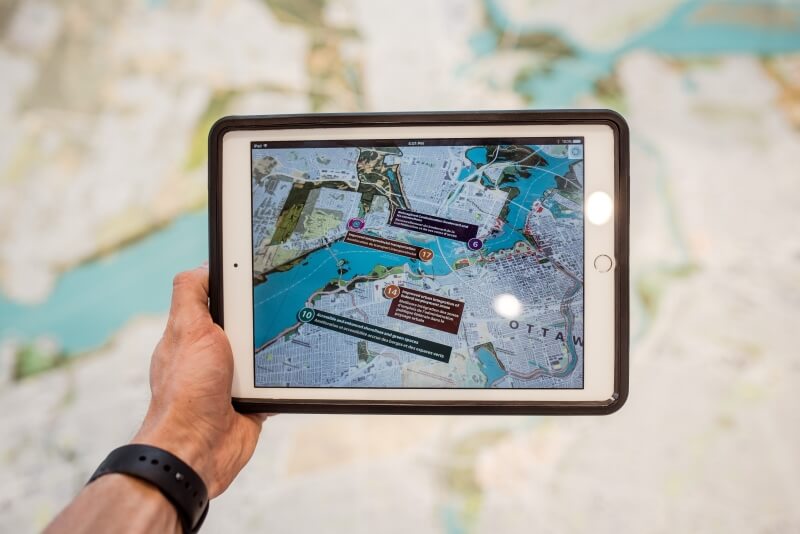Are you looking to take your hotel's guest experience to the next level? Then listen up, because Augmented Reality (AR) could just be the game-changer you need. This technology is just one of the ways innovation is taking travel and tourism marketing to exciting new heights. It’s not only changing the customer experience, but revolutionizing the sector as a whole, with its full potential still waiting to be unlocked.
In this article, we’ll immerse you in the world of AR, exploring how its use within hotels and hospitality can boost your business above and beyond the competition.
Table of contents
What is AR or augmented reality?
AR or augmented reality is a kind of technology that uses digital components to change a person’s perception of their surroundings using a compatible device such as a smartphone. Unlike virtual reality, which changes your surroundings, AR allows real-world elements to come to life to create more interaction, whether that be points of interest or restaurants.
This technology is yet to be exploited to its full potential, but the benefits of using it within hospitality are more than worth exploring. AR helps create a more connected guest experience by providing immersive and interactive elements, such as virtual tours or real-time information about your property. This captivating technology boosts guest engagement and works alongside other modern services like online guest portals or self-service kiosks.

What are the benefits of using augmented reality in tourism?
Augmented reality (AR) offers significant benefits for the tourism sector, especially with smartphones constantly in our hands, unlocking a world of potential.
Since AR can be easily accessed through mobile devices, it serves as a powerful marketing tool for hotels, providing interactive content that helps influence travelers' decisions and builds trust with potential clients.
One key advantage of AR is its ability to enhance both the local surroundings and the hotel itself. Guests can explore rooms and facilities virtually before even setting foot inside—an excellent way to convert new visitors and turn them into loyal customers.
Additionally, AR allows potential guests to engage with your offerings in a more engaging way, even encouraging last-minute bookings by delivering instant information, such as directions to your hotel. Essentially, AR acts as a 24/7 guide in their pocket, offering features like translation and making tourist spots even more appealing.

5 ideas for how to use AR in the tourism industry
AR offers countless possibilities in the tourism sector, as we've already explored. Whether it's guiding visitors through a city, offering reviews and key details about your hotel, helping guests discover local restaurants, or enhancing tourist spots with immersive 3D experiences – the possibilities are endless.
Let’s dive deeper into how this technology can aid the tourism industry.
1. Excursions and attractions
Transform traditional tours into futuristic experiences by using AR to enhance top visitor sites. AR can show how an area looked in the past or illustrate the transformation of landmarks over time with 3D models and live representations of historical figures.
AR also adds an element of fun through gamification, navigation aids, and quizzes, making tours and attractions even more engaging for visitors.
2. Transportation
Navigating a city becomes more exciting with AR. Apps can highlight landmarks along the way and offer directions in multiple languages. If tourists are unsure of their path, interactive arrows can guide them, and they can even preview their destination before arriving.
3. Enhanced cultural experiences
In museums or cultural settings, AR can bring exhibits to life with interactive displays and animations. Visitors can scan art pieces or artifacts to unlock additional content, enriching their overall experience.
4. Make travel accessible for everyone
AR can make travel more accessible. For individuals with reduced mobility or physical limitations, virtual versions of tourist destinations allow them to explore places like the narrow canals of Venice or the heights of Annapurna from the comfort of their home.
5. Improve the airport experience
AR not only enhances the airport experience but also simplifies navigation in large airports. Travelers can use their smartphones to be guided by AR through security, to their gate, or to nearby restaurants or shops. Additionally, AR can provide real-time updates on gate changes, boarding times, or delays.
And in the hotel sector, specifically?
Augmented reality is not only beneficial for the tourism sector in general but also offers unique advantages for your hotel. Let’s explore some of the key use cases.
1. Make your hotel more interactive
We’ve discussed how AR technology can serve as a powerful marketing tool to guide first-time visitors to your hotel, but it’s also effective in enhancing guest retention and making their experience more engaging.
A traditional tourist map can come alive with AR, allowing guests to discover places of interest, restaurants, bars, and more. Your hotel restaurant can even utilize AR to present the menu and ingredients in an innovative way, letting guests visualize dishes in 3D from their smartphones.
2. Guest services 2.0
Hotels are always seeking ways to elevate the guest experience, and augmented reality can be an excellent tool for this purpose.
The technology can help break down language barriers between guests and staff by providing real-time translations of signs, menus, and other materials when guests point their smartphones at them. This instant translation makes it easier for guests to understand hotel features and services without relying solely on staff for explanations. Combined with a virtual concierge that facilitates online check-in and check-out, as well as messaging, you can provide a seamless digital guest journey that enhances the overall experience with hotel guest experience software.
3. Integrate with Other Technology
AR can be integrated with other technologies, such as beacon technology, to enhance your hotel's marketing efforts and facilitate upselling through push notifications. For example, hotels can send special offers or discounts from partner businesses directly to guests' devices, and vice versa, allowing partner businesses to promote your hotel. This technology can even enable guests to unlock their hotel rooms as they approach, adding another layer of convenience.
Increase guest experience and customer satisfaction
AR can significantly enhance the guest experience and boost customer satisfaction by offering immersive, engaging, and unique hospitality and tourism experiences. It taps into a guest’s sense of play and curiosity, creating a fun and interactive way to explore their surroundings.
By overlaying digital information onto the real world, AR allows guests to access instant information, navigate more easily, and manage expectations by providing a virtual, interactive preview of their accommodations before arrival. With its language translation and accessibility features, AR helps overcome communication barriers, further improving the guest experience and satisfaction.

5 ways AR can increase your hotel revenue
The benefits of AR go beyond just guest satisfaction and an improved experience, they also carry over to your hotel’s bottom line.
1. Enhanced in-room shopping and e-commerce
While guests may not always be eager to buy branded items, AR can change that by allowing them to virtually try on products like branded hoodies or bathrobes right from their room. This immersive experience makes it more likely for them to proceed with the purchase. The same applies to mini-bar items or premium toiletries — guests can view what’s available through AR while relaxing in bed, increasing the chances of them making a purchase in a stress-free, comfortable mindset.
2. Room upgrades thanks to virtual tours
With virtual tours, guests can explore the added benefits of upgrading to premium suites or rooms. AR provides an interactive way to showcase these upgrades, highlighting why they’re worth the extra cost. Even after checking in, guests can explore upgrades, giving your hotel the opportunity to boost its average daily rate by encouraging guests to switch to more premium rooms during their stay.
3. Upselling
AR also excels at upselling additional services such as spa treatments, dining experiences, or exclusive amenities. By visualizing what they’re purchasing beforehand, guests are more likely to book these extra services, driving additional revenue.
4. Interactive room service
Descriptions alone might not be enough to tempt guests to order room service. With AR, guests can visualize menu items before placing an order, see all ingredients, nutritional details, and allergens. This ensures guests know exactly what to expect, increasing their satisfaction and encouraging repeat room service orders, ultimately raising their daily spend.
5. Promote off-peak activities
Convincing guests to use certain services during off-peak hours can be a challenge. However, AR can help by showcasing real-time promotions for services like spa treatments or massages, enticing guests to take advantage of these activities during quieter times. This boosts revenue by filling gaps in your hotel’s schedule.
Conclusion
We’ve explored how augmented reality can transform the tourism and hotel sector, highlighting its benefits and potential uses. There’s no doubt that AR is a powerful tool for creating new business opportunities and enhancing travel experiences.
Additionally, AR helps you attract potential customers and expand your services by tapping into new technologies that engage wider audiences. Learn more about how to reimagine the future of guest experiences.
By leveraging modern devices and tools, you can overcome language barriers, improve navigation, and boost bookings by offering a unique, one-of-a-kind experience. Embracing these technologies enhances your visibility and brand perception, catapulting your hotel into the digital age and setting you apart from the competition.
Looking to better understand today's travelers?
Download our guide "Understanding the Modern Guest"


2026 Hospitality Industry Outlook
Download now
Table of contents
Hospitality hot takes straight to your inbox



.webp)
